| Srl | Item |
| 1 |
ID:
140694
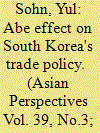

|
|
|
|
|
| Summary/Abstract |
Prime Minister Abe Shinzo’s decision to enter talks on the TransPacific Partnership (TPP) has been a game changer in the competition over Asia Pacific free trade agreements (FTAs). His move helped to create a space for multilateral, mega-FTA competition before South Korea could fully prepare and implement its “global FTA hub strategy” predicated on bilateral deals. In this article, I provide an overview of South Korea’s evolving strategies toward FTAs and explore how it has responded to the “Abe effect.” My focus is on two challenges for South Korea in participating in the TPP: US geopolitical pressure once Japan entered negotiations, and the de facto FTA negotiations with Japan under the TPP. Dealing with Japan is an especially tall order given the troubled history of South Korea–Japan economic and political relations. KEYWORDS: Korea-Japan relations, TPP, Abe Shinzo, hub strategy, security-economy nexus.
|
|
|
|
|
|
|
|
|
|
|
|
|
|
|
|
| 2 |
ID:
140683
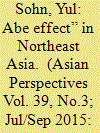

|
|
|
|
|
| Summary/Abstract |
IN DECEMBER 2012 ABE SHINZO RETURNED TO POWER AFTER FIVE years in the political wilderness. Since taking office he has solidified his political leadership by winning all successive elections, paving the way to becoming one of the longest tenured premiers in postwar Japan. His security and foreign policies have already changed the landscape of international relations in East Asia as Tokyo’s relations with Seoul and Beijing spiraled down to new lows for the post–Cold War era. Abe’s new security policy, under the slogan “Proactive Contribution to Peace,” helped bring the Japan-US alliance to an unprecedented level of closeness, clearly pitted against China. The Abe government is also potentially challenging the China-centered new economic order by promoting the US-led Trans-Pacific Partnership (TPP) trade network. Abe’s decision to enter the TPP talks became a game changer in the race for free trade agreements in Asia and the Pacific.
|
|
|
|
|
|
|
|
|
|
|
|
|
|
|
|
| 3 |
ID:
097227
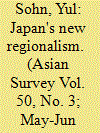

|
|
|
| 4 |
ID:
106464
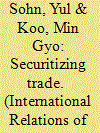

|
|
|
|
|
| Publication |
2011.
|
| Summary/Abstract |
The Korea-US free trade agreement (KORUS FTA) of 2007 clearly shows how countries simultaneously pursue economic benefits and strategic interests in trade negotiations. This study argues that the surprise launch and the successful conclusion of the KORUS FTA illustrate the joint efforts by the United States and the Republic of Korea to re-securitize their bilateral economic relations. Security and strategic calculations held by top policy-makers on both sides catalyzed the official launch of FTA negotiations by removing a number of longstanding trade irritants such as Korea's screen quotas and ban on US beefs. At the post-negotiation stage, however, the lack of bipartisanship-particularly in the United States-to provide trade liberalization for their allies in favor of their own broader strategic interests has led to the legislative stalemate of executive efforts at re-securitization of trade relations. This study concludes that the stalemated ratification process shows the erosion, not the strength, of US power to provide security and trade liberalization as public goods.
|
|
|
|
|
|
|
|
|
|
|
|
|
|
|
|
| 5 |
ID:
119106
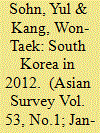

|
|
|
|
|
| Publication |
2013.
|
| Summary/Abstract |
An election year in South Korea witnessed a rise in deep discontent and distrust with the current political system that failed to address a growing demand for rebalancing in both domestic and foreign policies. Conservative successes led by Park Geun-hye in two elections demonstrate that South Korean voters do not support the opposition's promise for radical reform. But the most significant message of the 2012 elections was that existing party politics could not be sustained without some fundamental political reforms, expressed by the "Ahn syndrome" yearning for new politics.
|
|
|
|
|
|
|
|
|
|
|
|
|
|
|
|
| 6 |
ID:
130195
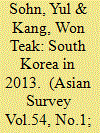

|
|
|
|
|
| Publication |
2014.
|
| Summary/Abstract |
The new government led by President Park Geun-hye faced challenges that the previous government had largely failed to address: rising income disparity, stagnant growth, political reform, and foreign policy issues, including a nuclear North Korea and an assertive Japan. Park's foreign policy scored some successes while her old- style management of political affairs supported by the old guard caused a prolonged political stalemate with the opposition party.
|
|
|
|
|
|
|
|
|
|
|
|
|
|
|
|
| 7 |
ID:
168513
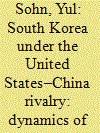

|
|
|
|
|
| Summary/Abstract |
With the advent of the Trump administration and the subsequent U.S.–China trade conflict, South Korea's trade policy is under immense pressure. The KORUS FTA has been pushed for renegotiation while the China–South Korea trade relations have stumbled after the THAAD deployment to South Korea. This challenge can be characterized by the economic-security nexus shifted from positive to negative: that is, South Korea is compelled to either sacrifice its economic benefits in favor of security interest or vice versa. In contrast to Japan that seeks to retain TPP as a way of benefitting from a regionwide trade integration and balancing both Trump unilateralism and Chinese mercantilist influence, South Korea is forced to play a more complex game. Given its deep yet asymmetric economic interdependence with China and North Korean security threats, South Korea needs to accommodate China while at the same time courting US engagement in resolving the North Korean nuclear problems.
|
|
|
|
|
|
|
|
|
|
|
|
|
|
|
|
| 8 |
ID:
082908


|
|
|